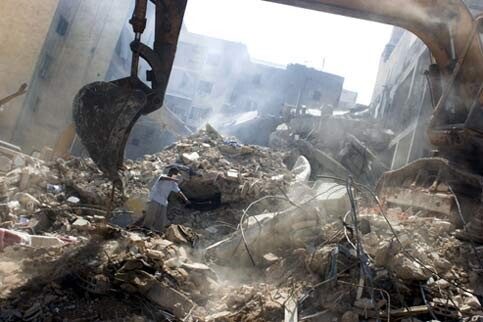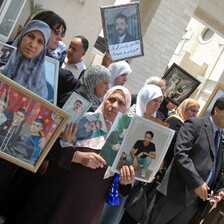Electronic Lebanon 12 August 2006

Lebanese rescue workers search through the rubble for survivors after an Israeli air strike in the Shiyah district in south Beirut killed 31 persons, 8 August 2006. (MaanImages/Raoul Kramer)
Britain and Europe must take a lead in halting Israel’s wanton destruction of my country
For a month now, as the international community has vacillated, Israel has besieged and ravaged Lebanon, creating a humanitarian and environmental disaster and shattering our infrastructure and economy. In the name of the Lebanese people, I again demand an immediate ceasefire and withdrawal of Israeli troops. The international community has an obligation, under the UN charter, to defend Lebanon’s sovereignty and protect our people under humanitarian law. Given the historic ties with our region, Lebanese look to Europe and Britain to take a lead through the UN in putting an end to this aggression.
Israel says this war is against Hizbullah, not Lebanon. But the Israeli terror is inflicted on all Lebanese. The indiscriminate murder of more than 1,100 Lebanese civilians (a third of them children), the massacres and “cleansing” of villages and the wanton destruction of our infrastructure are nothing short of criminal. One quarter of our population has been displaced. On behalf of all Lebanese, I demand an international inquiry into Israel’s actions in Lebanon, and insist on reparations.
I have proposed a comprehensive seven-point peace plan, rooted in international law, which takes into account the interests of all parties to this conflict. It was adopted by the Lebanese council of ministers, which of course includes Hizbullah, and is supported by a broad national consensus.
There is, and should be, no military solution. The plan therefore calls for an immediate, unconditional and comprehensive ceasefire and the release of Lebanese and Israeli detainees; the withdrawal of the Israeli army behind the established “blue line” between the two states; a UN commitment to put the Shebaa Farms area and the Kfarshouba Hills under its jurisdiction until Lebanese sovereignty over them is settled; the extension of Lebanese government authority over its territory through its legitimate armed forces; an expansion of the UN international force in south Lebanon, with a wider mandate and scope of operation, to undertake humanitarian work and guarantee security; UN action to enforce the 1949 armistice agreement between Lebanon and Israel; and a commitment by the international community to support Lebanon’s relief, reconstruction and development needs.
As part of the plan, the Lebanese government has decided to deploy 15,000 Lebanese troops in southern Lebanon as the sole military force in the area, alongside UN forces, the moment Israel pulls back to the international border.
The draft UN security council resolution proposed by the US and France failed to address the key points of our plan, and was rejected by all Lebanese. The idea of an international force being sent to Lebanon directly challenges our sovereignty, and we can never accept that. If the UN resolution is to have any chance of succeeding, it must not only take into account the wishes of the Lebanese people, but must address the root causes of this war: Israel’s occupation of Lebanese territories and its perennial threat to Lebanon’s security.
If Israel would realise that the peoples of the Middle East cannot be cowed into submission, that their will to resist grows ever stronger with each village destroyed and each massacre committed, it could also be a stepping stone to a final solution of the wider Arab-Israeli conflict. A political solution cannot, however, be implemented as long as Israel continues to occupy Arab land in Lebanon, Gaza, the West Bank and in the Syrian Golan Heights, and wages war on innocent people in Lebanon and Palestine.
Fouad Siniora is the prime minister of Lebanon. This article was originally published by The Guardian.
Related Links


